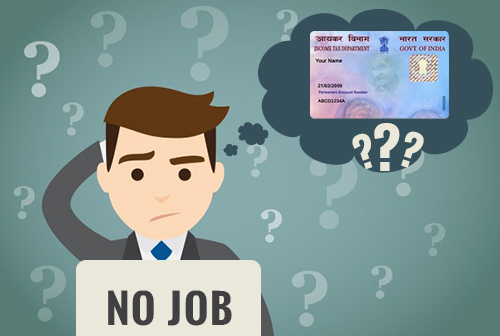
A common misconception surrounding PAN card is that it is required only by those who earn through a job or business. However, it is required by every individual at some point in their life even if they are not earning. Other than being used for filing income tax returns, PAN has several other important uses, even for no earners. Let’s read further to see what PAN card can do for a non-earning individual.

Get FREE Credit Report from Multiple Credit Bureaus Check Now
- Identification Proof – PAN card serves as a legitimate proof of identity across the country. It is acceptable in all government and non-government avenues along with other documents such as Aadhaar card and voter ID card.
- New Account in a Bank or Post Office – It is mandatory for every individual to provide a self-attested copy of their PAN cards to open an account in a bank or post office. However, this rule is not applicable to Basic Savings Bank Deposit Accounts (BSBDA), which includes zero balance savings accounts such as Jan Dhan.
- Cash Deposit/Purchase in Banks – To prevent money laundering, PAN card is compulsory for anyone who wants to make a cash deposit or withdrawal of more than Rs.50,000/- in a day from the bank. Other than this, PAN details are compulsory even at the time of purchasing a bank draft, pay order or banker’s cheque amounting more than Rs.50,000/- on any one day.
- Credit Card Application – Once you open your bank account, you need a credit card for easy and anytime money transactions. Credit card request to a bank, co-operative banks or any other financial institution requires PAN card.
- Fixed Deposit – Individuals who want to invest an amount of Rs.50,000/- or above in a fixed deposit (FD) with post offices, co-op banks, Nidhi and NBFC companies will need PAN. Deposits amounting to more than Rs.5 lakh during the year will also need PAN.
- Loan Application – Even if you’re not earning, you may need to apply for an education, business or any other loan in future. If you’re planning to apply for a loan, you are required to give your PAN details to the lender.
- Life Insurance – You need PAN card even when applying for a life insurance. The PAN details are required if you are paying more than Rs.50,000/- in a year to an insurance company as a premium.
- Foreign Travel/Currency Exchange – You need PAN even when planning to travel abroad. If the cash payment related to currency exchange or foreign travel (including fare and payment to travel agent) is of more than Rs.50,000/- at a time, you will need to give your PAN details.
- Buy/Sell Vehicles – Individuals who are planning to buy or sell a motor vehicle (except two-wheelers) need to give a self-attested copy of their PAN card during the transaction.
- Buy/Sell Property – Buying and selling of a property involves a lot of money. Therefore, when buying or selling an immovable property anywhere in India of a value more than Rs.10 lakhs, you need to give your PAN details.
- Hotel/Restaurant Bill – You need to submit your PAN details, if you are paying a bill of Rs.50,000/- or more in cash at a restaurant or hotel.
- Investments – To save tax, people invest a large amount in tax-saving mutual funds. Therefore, you need to give your PAN details when you’re buying mutual fund units, debentures and bonds for more than Rs.50,000. The PAN details are also required when you want to open a demat account.
- Sale/Purchase of Goods/Services – An individual selling or purchasing any goods or services for more than Rs.2 lakh per transaction will need to submit his/her PAN details.
- Aadhaar Card Application – PAN card is not a must but is one of the necessary documents required for Aadhaar card application. However, it is mandatory to get your PAN linked with Aadhaar if you want to file your income tax return.
2 Comments
My wife ( 66 years old) got pan. She doesn’t earn income. Because of having pan has she to file income tax return?
No, your wife is not mandatorily required to file her income tax return unless her income falls within the taxable bracket or she wants to avail some kind of credit in future.